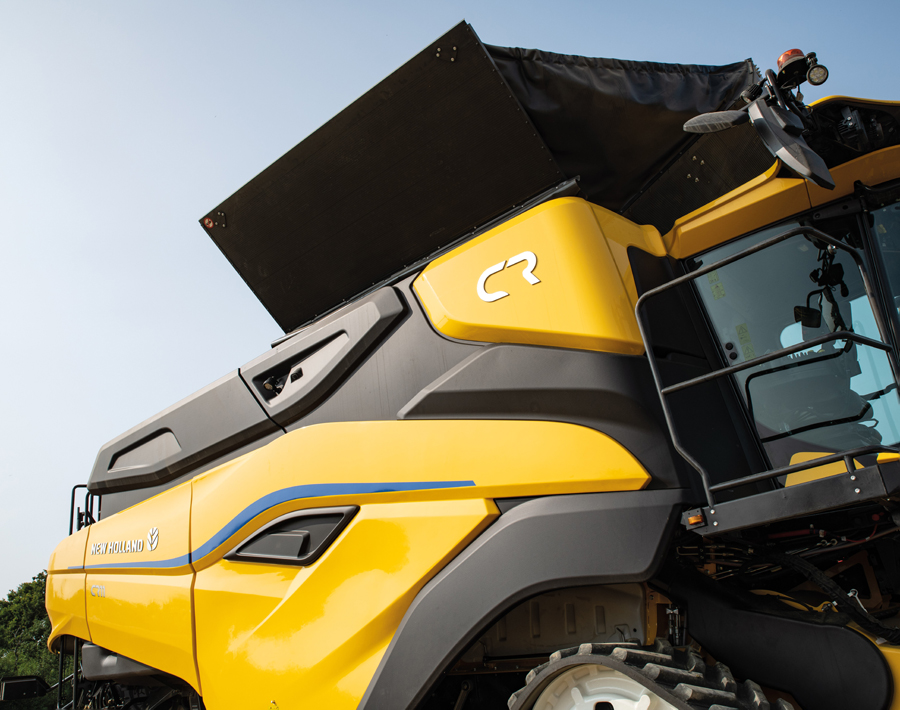Major Belgian factory investment marks development of new harvester set to enhance arable farm efficiency

CNH Industrial
- World-leading combine harvester to be produced at New Holland’s Center of Harvesting Excellence in Zedelgem, Belgium
- Machine to be produced on completely renewed assembly line part-funded by government support alongside investment from parent firm CNH Industrial
- New CR11 combine extends further the productivity, efficiency and sustainability credentials of the existing world-record-holding CR10.90
In a major development in high-capacity harvesting set to help large farms gather their crops more efficiently and more sustainably, New Holland Agriculture is to launch worldwide the new CR11 combine harvester, allowing farmers to cover more hectares in less time to use fuel as efficiently as possible – and all thanks to significant investment in the brand’s factory in Zedelgem, Belgium. The machine’s gentle threshing action minimizes damage to the grain, while new developments within the CR11 ensure almost all grain retained as it passes through the harvester, meaning losses are close to zero, with only straw and chaff exiting at the rear.
The New Holland CR11 combine harvester gained international recognition during its global unveiling to the world’s farmers at Agritechnica 2023, the German exhibition that is the world’s largest farm machinery show, where it received the only Gold Medal assigned at the fair’s Innovation Awards. The prestigious recognition was particularly meaningful given the event’s guiding theme, “Green Productivity”. Engineering ingenuity from Zedelgem incorporated into the New Holland CR11 has the potential to reduce harvesting time per hectare by up to 25%, and lower fuel consumption by around 20%. Along with a wider 15m cutting width that means fewer field passes are required, this all also helps significantly reduce related carbon emissions.
The machine’s environmental credentials are further boosted by a new automated system to spread the straw residue back across the cutting width to the field surface, to aid soil organic matter content, and reduced ground compaction courtesy of large tyres or tracks that spread harvester weight over a large area, helping save on tillage before the next crop season, further reducing the fuel needed for a full crop cycle per hectare.
The new combine was designed – and will be produced – at New Holland’s Center of Harvesting Excellence in Zedelgem, Belgium. To prepare for full production of the new CR11, the factory has undergone a complete assembly line renovation, thanks to government-supported company investments in modernization.
One of the main improvements is the introduction of automatic guided vehicles (AGVs) which have replaced the traditional assembly line, allowing more flexibility in the manufacturing process and the accommodation of machines with different characteristics, significantly improving efficiency. In keeping with New Holland’s commitment to sustainability and better management of waste, new integrated oil filling stations improve production quality and minimize oil spillage risk when filling the machines with the fluids they require before leaving the production line. Visitors to Zedelgem can now observe the full process of that production line thanks to a new factory tour format, with complete visibility of the full manufacturing process.
The new CR11 builds upon the success of the current New Holland flagship combine, the CR10.90, which has held the world record for the most wheat harvested in eight hours – 797.656 tons – for almost a decade, since August 15, 2014. The 50th anniversary of the introduction of New Holland Twin Rotor™ technology – which uses two longitudinal rotors to thresh and separate grain from straw and chaff – will occur in 2025, over which time the system has become part of New Holland’s DNA. The new CR11 is designed to meet the continued evolution of harvesting demands for greater capacity, minimal grain loss and maximum protection of grain quality. Higher-yielding crops and unpredictable weather can affect both one season’s crop and the next, and the new harvester overcomes these challenges by clearing fields quickly to protect grain quality and allow the following year’s crop establishment to take place in good time and in good conditions.





